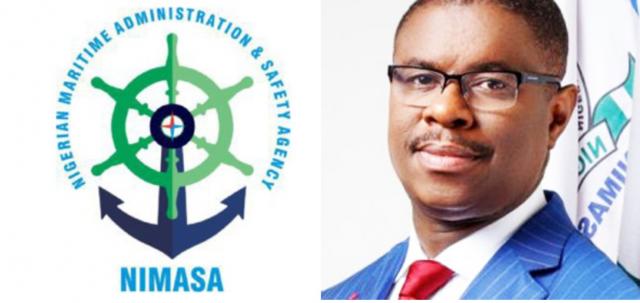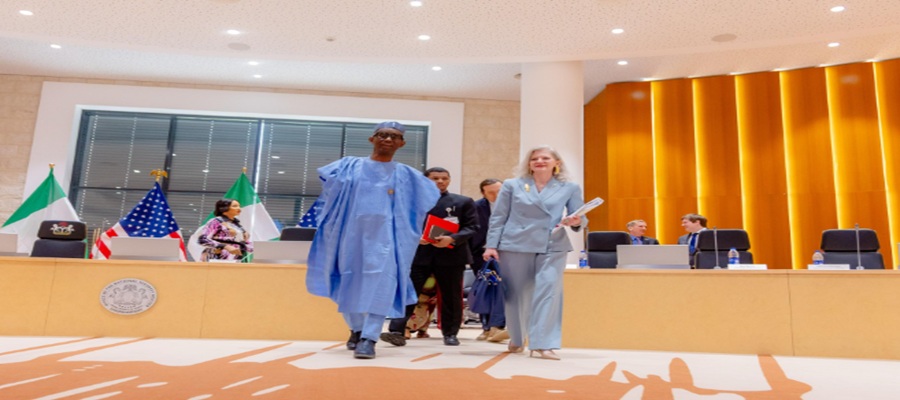General News
NIMASA Renews MoU with World Maritime University

The Nigerian Maritime Administration and Safety Agency (NIMASA), has renewed its Memorandum of Understanding (MoU) with the World Maritime University (WMU), Malmo, Sweden, to boost capacity building.

Dr Bashir Jamoh, the Director-General of the agency, in a statement in Lagos on Sunday, noted that the MoU would also assist the growth of the Nigerian maritime sector.
Speaking after the signing of the virtual of the MoU, Jamoh noted,” there is no substitute to education.
“The collaboration with the World Maritime University by NIMASA is to advance maritime interest, while addressing the changing needs of the maritime industry.
”This is based on sustainable capacity development; education, training and capacity building as well as play a major role in developing shipping in any nation.’’
Jamoh said that the agency was at an advanced stage of setting up a ‘Regional Maritime Safety and Security Research Centre’, to enhance research works.
He added that the centre would take care of capacity development in 25 African countries
“Graduates from the WMU, who are in the employ of the agency will serve as researchers and resource persons, sharing knowledge.
”And hopefully develop a research-based sustainable framework to provide solution to issues of insecurity in the Gulf of Guinea.
“The NIMASA Regional Maritime Safety and Security Research Centre will be a centre of excellence in research and we will collaborate and cooperate with other countries,” the director-general said.
The President of the WMU, Dr Cleopatra Doumbia-Henry noted that NIMASA was playing a leading role in developing capacity for the maritime industry in the Gulf of Guinea region.
She commended Nigerian students who had passed through the university, welcomed the agreement and added that” NIMASA was one of the first supporters of WMU”.
Doumbia-Henry said that the initiative also supported the WMU’s commitment to the UN Sustainable Development Goals (SDGs).
“Nigeria leads, others follow. WMU is delighted to be associated with NIMASA and its work which extends beyond national boundaries and has a significant effect on the whole region.
“We are also pleased to have such a successful and warm relationship with NIMASA and its staff. It is a perfect example of international cooperation for sustainable growth.
“I look forward to the fruitful outcome of our collaborative efforts as articulated in the memorandum and based on the principles of equity, reciprocity and mutual benefit,” she said.
It would be recalled that the agreement provides for maritime education, training, research and capacity building for officers of NIMASA.
Also, no fewer than 10 officers will be funded annually by the Agency to study at WMU in the MSc in Maritime Affairs programme based in Malmo, Sweden.
In addition, under the Agreement, NIMASA will sponsor at least one officer per year to study in the WMU/IMLI MPhil programme in International Maritime Law and Ocean Policy.
The agreement also provides for WMU to develop and organise short-term, specialised Executive Professional Development Courses (EPDCs), for NIMASA officers.
General News
Nigeria Treats Religious Violence as Attack on State – NSA Ribadu

National Security Adviser Nuhu Ribadu has said the federal government considers religious violence an attack on the Nigerian state, stressing that the protection of all citizens, regardless of faith, is non-negotiable.

According to presidential spokesperson Bayo Onanuga, Ribadu made the remarks in Abuja at the close of a US–Nigeria Joint Working Group session.
“Nigeria is a deeply plural society, and the protection of all citizens, Christians, Muslims, and those of other beliefs, is non-negotiable,” Ribadu said.
“Violence framed along religious lines is treated as an attack on the Nigerian state itself.”
In a follow-up post on X, Ribadu said the joint working group has recorded “tangible operational gains” in the fight against terrorism.
The working group was set up following Nigeria’s designation as a Country of Particular Concern (CPC) by US President Donald Trump, a label that often triggers policy actions aimed at ending severe violations of religious freedom.
At the meeting, Ribadu led Nigeria’s delegation, which included representatives from 10 ministries and agencies, while the US delegation, made up of eight federal agencies, was led by Allison Hooker, US under-secretary of state.
Ribadu said Nigeria-US security cooperation has moved from dialogue to action, resulting in the disruption of terrorist networks and transnational criminal groups. He also praised the US for supplying drones, helicopters, platforms, spare parts, and other support systems over the past five years.
Speaking at the session, Hooker said the US was committed to expanding its partnership with Nigeria, particularly on deterring violence against Christian communities.
“Today, we are here to discuss how we can work together to deter violence against Christian communities, prioritising counter-terrorism, insecurity, investigation of attacks, and holding perpetrators accountable,” she said.
She added that efforts would focus on reducing killings, forced displacement, and abductions of Christians, especially in Nigeria’s north-central states
General News
PalmPay User Shares Experience on Fintech Apps to Trust in Nigeria

For many Nigerians, fintech apps are judged by one simple question: Can I trust the platform? For Happiness, a young Nigerian entrepreneur, the answer manifested in the most defining moments of her life.

Trust Built Through Everyday Use
In 2025, Happiness relied on PalmPay to run her business, from receiving customer payments, paying vendors, and managing daily transactions. During PalmPay’s Hustle Grant Campaign, she joined thousands of small business owners hoping to win the N500,000 funding.
While she didn’t make the shortlist, the campaign gave her business something just as valuable: visibility. New customers discovered her brand, enquiries increased, and sales followed.
PalmPay didn’t just host a campaign; it created an ecosystem where small businesses could be seen and supported.
Just days later, Happiness’ life changed. On August 30, 2025, she lost her father. With this loss came challenges, especially payments. They tried transferring money through regular banks but were met with declined transactions. Happiness suggested using her PalmPay account and it was successful.
In a moment defined by loss and urgency, PalmPay cut through the chaos, proving that reliability isn’t a feature, it’s a lifeline. Happiness’ relationship with PalmPay didn’t stop at transactions. Through other management tools on the app, she learned to build discipline around her finances.
More Than an App, a Financial Partner
Beyond transactions, PalmPay’s tools helped Happiness build better money habits and financial discipline. Today, the brand continues to reward reliability through initiatives like its ongoing Premier Cool campaign, reinforcing a simple message: consistency should come with value.
The idea is simple: Purchase a bar of soap and stand a chance to get ₦10,000cash and other cash benefits.
It’s PalmPay’s way of saying that smart money habits deserve real value in return.
Why PalmPay Earns Trust
Life doesn’t give warnings before it tests you. When it does, you need a platform that doesn’t just usually work but always works.
For many users, PalmPay proves to be more than a payment app. It is a trusted partner powering ambitions, supporting users through defining life moments, while helping them bank smartly.
When it mattered most, PalmPay worked. To watch the full testimonial visit: @palmpayapp_ng
General News
Nigerians Target Self-Improvement, Business Startups in 2026 Google Data

Google Search data from the first two weeks of 2026 reveals Nigerians are prioritising ambition, self-growth, and entrepreneurial ventures as they embrace the new year with renewed drive for personal and professional excellence.

The data shows a 40 per cent spike in searches related to self-improvement and “becoming better”, reflecting a nationwide shift from mere resolutions to actionable plans across boardrooms, classrooms, and homes. Entrepreneurship leads the charge, with “how to start a business” topping “how to start” queries after an 80 per cent surge, alongside rising interest in blogging, podcasting, and YouTube channels to foster economic opportunities.
Personal development dominates, as searches for “how to be a better person” rose 20 per cent, extending to relationships with queries on becoming better lovers, partners, husbands, wives, and listeners. Health resolutions gain traction, with 40 per cent increases in “how to eat healthy”, “healthy diet”, and “how to meditate” underscoring commitments to physical vitality and mental wellness.
Skill mastery captivates diverse audiences, from “how to improve English” and communication skills to enhancing memory, credit scores, and even handwriting, while leisure pursuits spike in “how to get better at” chess, singing, running, Fortnite, and soccer. Top searches include “how to improve communication skills”, “how to be a better listener”, and entrepreneurial starters like “how to start a podcast”, painting a portrait of a nation honing edges for success.
Taiwo Kola-Ogunlade, Communications and Public Affairs Manager for West Africa at Google, described the trends as a “powerful reflection of Nigeria’s collective ambition”, affirming the company’s dedication to tools like Search and Gemini for guiding Nigerians toward prosperity

 General News3 days ago
General News3 days agoPalmPay User Shares Experience on Fintech Apps to Trust in Nigeria

 News3 days ago
News3 days agoStakeholders Demand Stronger Governance and Infrastructure to Drive Tech Adoption @ Lagos AI Summit

 General News3 days ago
General News3 days agoNigerians Target Self-Improvement, Business Startups in 2026 Google Data

 News3 days ago
News3 days ago35 Million Nigerians Face Acute Hunger in 2026, UN Warns

 General News3 days ago
General News3 days agoHow Inside Jobs and Policy Shocks Trigger Nigeria’s Rising Loan Crisis

 E-Financial14 hours ago
E-Financial14 hours agoFirst Asset Management Receives Upgraded Ratings from Agusto &Co and DataPro

 General News14 hours ago
General News14 hours agoNigeria Treats Religious Violence as Attack on State – NSA Ribadu

 News14 hours ago
News14 hours agoAnambra Cuts Monday Pay to Kill Sit-at-Home

















